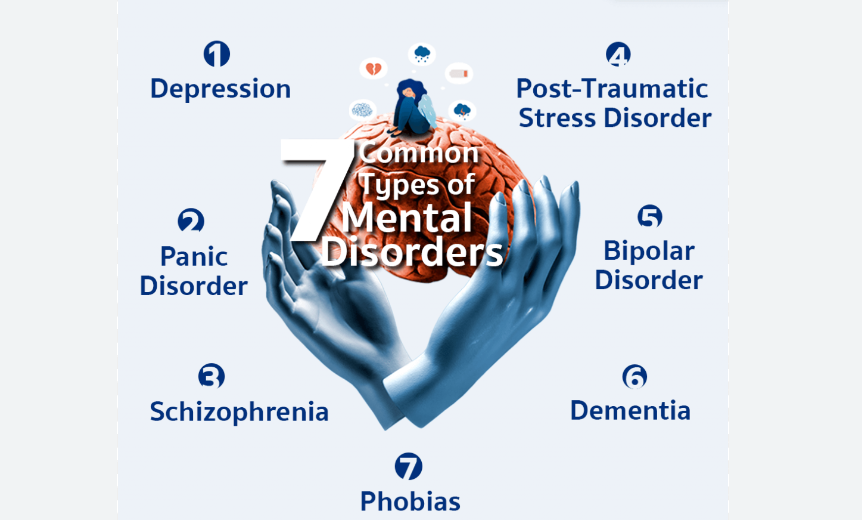The world’s biggest problem is mental health. It defines the way we think, feel, and act in daily life is fundamentally influenced by our mental health. It affects our capacity to deal with stress, overcome obstacles, communicate with people, and make decisions. In this extensive manual, we define mental health, discuss prevalent mental health conditions, look at available treatments, and provide guidance on preserving mental health so that you can live a longer, happier life.
What is Mental Health?
Mental health encompasses all aspects of our well-being and is reflected in our thoughts, feelings and behaviour. Good mental health involves the absence of mental illness. A person’s ability to learn, feel, express, and regulate a wide range of emotions, as well as their ability to fulfil a number of crucial requirements, such as establishing and preserving healthy interpersonal relationships, are all components of good mental health.
Why is mental health important for overall health?
Mental health affects our thoughts, feelings, and behaviours in day-to-day living, it is essential for total health. It has an impact on our capacity to manage stress, make choices, and interact with people all of which are critical to our general wellbeing. Strong mental health makes us more productive, builds strong bonds with others, and enables us to deal with change and hardship. On the other hand, poor mental state can result in serious physical health issues, such as a higher chance of heart disease, a compromised immune system, and a shorter life span. Thus, leading a balanced, healthy life and preserving physical health depend on maintaining mental health.
What is the root cause of a mental disorder?

A complicated interaction of genetic, biochemical, environmental, and psychological variables contributes to the root causes of mental diseases. Each has a role in the development and trajectory of mental health issues.
Mental Health Disorders
Conditions that affect a person’s thoughts, feelings, mood, or behaviour are commonly referred to as mental illnesses, often known as mental health diseases. The impact of a person’s capacity to interact with others and go about their daily life. They can be sporadic or persistent (chronic). Addiction to substances, eating disorders, schizophrenia, anxiety disorders, and depression are a few of the most prevalent mental health conditions.
Depression: Identified by a chronic state of melancholy and a lack of interest in or enjoyment from once-fulfilling or enjoyable activities.
Anxiety Disorders: Severe sensations of fear and anxiety are hallmarks of this category of mental health conditions.
Schizophrenia: A mental illness affecting a person’s capacity for coherent thought, feeling, and behaviour.
Eating disorders: These conditions are characterised by stressful and compulsive actions and thoughts about food, eating, and body image.
Addictive behaviours: Addictive behaviours are those that can interfere with day-to-day functioning, such as substance addiction and gambling.
Treatment or Therapy of Mental Health Disorders
Treatment for mental health illnesses may involve one or more of the following, depending on the specific illness and the needs of each patient:
Psychotherapy: Psychotherapy commonly called talk therapy, is a treatment option for those experiencing a wide range of mental health conditions and emotional challenges.
Medication: Generally used in conjunction with other therapies, medications can assist manage mental health disorders.
Lifestyle Modifications: This covers dietary, sleeping, and exercise regimens.
Support groups: They can give people access to a valuable network and show them that they are not travelling alone.
Maintaining Mental Health
Happiness often feels like an elusive state, but certain strategies, like strong personal relationships, which are incredibly important for mental well-being, can lift your spirits and lead to lasting happiness.
Treatment of mental health problems alone is not enough to maintain mental wellness. It also entails maintaining a healthy lifestyle and developing routines that promote general wellbeing:
Frequent Exercise: Exercise has a major calming effect on depression and anxiety.
Balanced Diet: Mental health is greatly influenced by nutrition. Emotions and energy levels can be impacted by a healthy diet.
Sufficient Sleep: Sleep has a major impact on our mental health.
Meditation and mindfulness: Meditation and mindfulness are two techniques that support mental health by lowering stress and helping to focus the mind.
Conclusion
A happy and satisfying existence depends on you being aware of and taking care of your mental health. Anyone can improve their ability to manage their mental health condition by being aware of the warning signals of these conditions and obtaining the right treatment. Attention to behaviours that support continued mental health and happiness is equally vital. Enjoying your best life is made possible by this all-encompassing strategy, which makes sure that taking care of your mental health becomes a daily routine. Realise that maintaining your mental health requires constant effort and close attention to your general wellbeing. It is not a destination.



